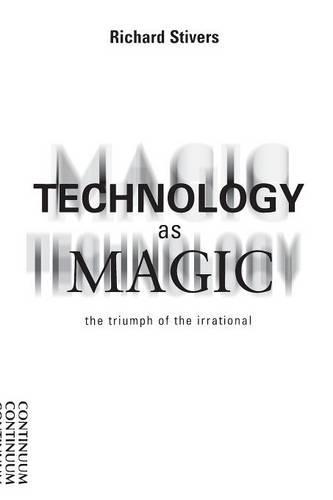
Technology as Magic: The Triumph of the Irrational
(Paperback)
Publishing Details
Technology as Magic: The Triumph of the Irrational
By (Author) Peter M.R. Stirk
Bloomsbury Publishing PLC
Continuum International Publishing Group Ltd.
1st July 2001
United Kingdom
Classifications
Tertiary Education
Non Fiction
Communication studies
Social theory
306.4
Physical Properties
Paperback
256
390g
Description
What gives the mass media, particularly advertising and television, their extraordinary power over our lives, so that even the most jaded and sophisticated among us are troubled and fascinated by their allure The secret, according to Richard Stivers, in this brilliant new book, lies in the curious relationship between technology and magic. Stivers argues the two are now related to one another in such a way that each has taken on important characteristics of the other. His contention is that our expectations for technology have become magical to the point that they have generated a multitude of imitation technologies that function as magical practices. These imitation technologies flourish in the fields of psychology, management administration, and the mass media, and their paramount purpose in human adjustment and control. Advertising and television programs, in particular, contain the key magical rituals of our civilization.In a fascinating analysis of television programming, Stivers shows how various genres--news, sports, game shows, soap operas, sitcoms, etc.--have their distinct mythological symbols. Through dramatized information, they symbolically connect consumer goods and services to desired outcomes--the utopian goals of success, happiness, and health--thus enveloping technology, both real and imitation, in a magical cocoon.
Reviews
"Prepare to be rewarded. Stivers' erudition, astringency and finely modulated outrage at the vast apparatus of technological hoodwinkery now operative in various well-intentioned (and some venal) bureaucracies all serve to make the book engrossing and compelling. Technology as Magic is full of startling insights into the sometimes visible, more often mystical appurtenances of technology, in which our society has vested its faith, and to which much of humanity has deeded its soul....Technology as Magic includes some remarkable-and entertaining-capsule histories of advertising, applied psychology, statistics, law, bureaucracy, and the theory and practice of management, all of which, in Stivers' view, are 'imitation technologies.'...Technology as Magic is a careful and urgent moral tome. It works brilliantly to disclose the intellectually suffocating, morally numbing and spiritually degrading effects of the technological milieu and its concomitant instrumental world-view."-Resurgence
"Professor Stivers, a soft-spoken radical, challenges us to rethink our assumptions about the glorious economic and technological gains at the end of the century and at the end of the millennium, and suggests that rather than being good news, there may be very bad news indeed! Technology as Magic is a book that makes us think, even if we don't want to, in an attack on our fondest assumptions."--Andrew M. Greeley, University of Chicago
"Richard Stivers is among the world's sharpest analysts and critics of the role of technology in society. In this book, he adds a fascinating exploration of how technologies-particularly those of advertising and television-have been able to penetrate the human psyche and to create an authority, believability, and power that border on the spiritual or magical. No one has made such a brilliant analysis of this tendency before, and Stivers is utterly convincing. He demonstrates along the way, the profound social and political consequences of this psychic sleight of hand. For anyone interested in systematic analyses of technology or in the hidden techniques behind the powers of mass media and advertising, this book is absolutely a must."-Jerry Mander, author of Four Arguments for the Elimination of Television and In the Absence of the Sacred
"Exposes both our childish faith in technology's power to fulfill our every wish and our dangerous vulnerability to psychological and managerial methods that mimic technological protocols in order to mask their underlying irrationality. Under the scrutiny of [Stivers'] tough-minded skepticism, the psychobabble of the therapist and the statistics of the efficiency expert betray themselves as species of modern magic, invoked to manipulate people for commercial and bureaucratic ends. But far more than a debunking of the technocratic mystique, the analysis summons us to the cultural struggle essential for a recovery of personal freedom and moral judgment. A profound and sobering work."-Booklist
"Convincing and lucid....persuasive and erudite."-Library Journal
Ranked: Exceptional --Today's Books, October 15, 2001
"Richard Stivers is to be congratulated for having found a new line of reasoning....Stivers masterfully illustrates his theme with a spectrum that stretches from the comical and innocuouys to the serious and sinister. His message deserves to be widely broadcast."--APA Review of Books
Author Bio
Peter M.R. Stirk is Senior Lecturer and Director of the Centre for the History of Political Thought at Durham University, UK. His previous books include Max Horkheimer: A New Interpretation (1992) and, as co-editor, An Introduction to Political Ideas (Pinter, 1995).
